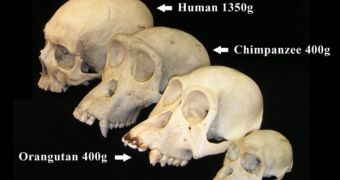Figuring out the differences between orangutans, chimpanzees and humans is not a complex process in itself. Any person given a photo of the primates, and one of a human, could easily point out at least a few dozen of them. But the mystery of what made us uniquely human after we became separated from primates evolutionarily is still very much a “cold case.” Now, new studies discovered another few genes, which might help clear the mystery a little bit. The paper was published online in the latest issue of the scientific journal Genome Research.
The newly discovered genes are believed to have appeared in humans shortly after we branched off primates, millions of years ago. Existing theories hold that the new genes that differentiate humans from primates appeared from rearranged or duplicated versions of existing ones. Some scientists argued that fully functional, protein-coding genes could not simply appear from modified DNA that was once inactive. However, this appears to be the case, the new investigation reveals. Researchers have already proven in previous studies that genes can be generated by non-coding DNA in fruit flies and primates.
Until recently, there have been no similar discoveries made in humans, e! Science News reports. The fact that they have been now identified raises some tantalizing possibilities as to how exactly we came to be so different from primates, and our species' common ancestor. In charge of the study were Trinity College Dublin Smurfit Institute of Genetics experts David Knowles and Aoife McLysaght. They undertook the laborious task of searching the human genome for protein-coding genes that did not appear in primates.
The team managed to employ several methods of reducing the number of genes that was originally found, and were left with three in the end. But then, just as they thought their work was done, a new challenge arose. “We needed to demonstrate that the DNA in human is really active as a gene,” McLysaght says. They found that DNA sequence differences in the genes present in the two families of species would essentially make the protein-coding ability in these genes ineffective in monkeys.
The next questions the team plans to tackle are what precisely do these new, human proteins do. “They are unlike any other human genes and have the potential to have a profound impact,” McLysaght, who believes that these structures may hold the answer to deciphering what makes us unique, says.

 14 DAY TRIAL //
14 DAY TRIAL //